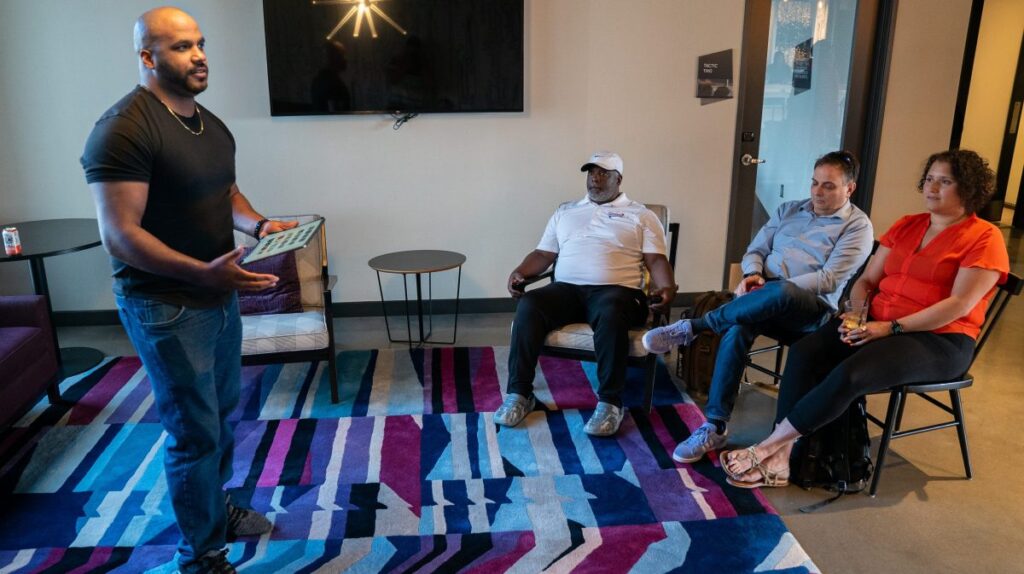The technology industry has changed dramatically in just a few years.
Many tech companies are cutting jobs. Across industries, companies across the country are advertising fewer tech-related jobs.
“I think there's a lot of correction going on in the market, a lot of pausing, rethinking and rethinking of strategies,” said Seth Robinson, vice president of industry research at CompTIA, a tech trade group.
That's bad news for a city hoping to become a tech hub like St. Louis, where tech advocates have long said the city needs to double its local workforce.
It's hard work, and it's even harder now because there are only half as many tech jobs available in the St. Louis area as there were a few years ago.
Many large companies, including Boeing and Mastercard, have offices and operations there, but Emily Hemingway, who runs the nonprofit TechSTL, argues that St. Louis needs to look beyond those companies to become a true tech hub.
“When you have significant employment losses, you can't rely on large anchor institutions and corporate partners to really mobilize the workforce,” she said.
Instead, Hemingway said the region needs to do more to support entrepreneurs and start-ups.
“If we can't find a good way to make money for these great people in St. Louis, they're either going to change industries or they're going to change towns,” she said.
After all, tech jobs are expected to grow faster than any other sector over the next decade, according to the Bureau of Labor Statistics, and St. Louis wants a piece of the action.
On a recent evening, several startup founders were catching up at the weekly Founders Lounge forum, an event where local entrepreneurs network and discuss the obstacles they face in starting their businesses.
Ricardo Martinez spoke about his experience starting Juntos Adelante, a website a few years ago that connects Spanish speakers with Spanish-speaking real estate and insurance agents.
“We were trying to take this national,” he said. “We were getting inquiries, information and questions from California, Texas.”
But Martinez said he has had to scale back the site's offerings because of complex regulatory environments in each state, and he struggled to secure funders for the project in St. Louis.
“It really makes me sad because I know this case has the power to change a lot of people's lives,” Martinez said.
Today, Martinez runs Juntos Adelante but also has other ventures, and although it's not always easy to start a tech company in St. Louis, he said he plans to stay.
“balance [between] “You can achieve your goals and still have a family and support your family, and that's what the Midwest is really all about,” Martinez said.
And that's the thing about being an entrepreneur in the center of the country versus a place like Silicon Valley, where the cost of living is much higher.
“It's a very low-cost, inexpensive way to bring an idea to life,” said Christian Johnson, who runs the weekly Founders Lounge events with geospatial startup Metis Analytics.
Johnson, a leader in St. Louis' entrepreneurial scene for nearly a decade, said the local ecosystem often lacks support and programs that go beyond promoting compelling ideas.
“It basically becomes a fashion show and not a show about people giving back to their community, bringing jobs to their community and creating great businesses that make their community better,” he said.
It's important for entrepreneurs to attract customers and get their ideas to the point where they can monetize them, Johnson explained.
That's one reason St. Louis has a long way to go before it can become an innovation community like Seattle or Austin, Texas. “A lot of it is organic,” CompTIA's Robinson says. “I don't know how much of it is plannable.”
Supporting entrepreneurship is also the right thing to do, he explained, especially when new companies enter niche industries that are already thriving in the region.
In St. Louis, those areas include geospatial information and agriculture.
“These types of startups already have some momentum and can thrive if they choose to expand and accelerate it,” Robinson said.
But he added that it's also important for companies looking to become tech hubs to think beyond start-ups or specific industries.
Robinson said that the growth of artificial intelligence and the demand for cybersecurity professionals means that businesses of all kinds will need more tech workers in the future.
There's a lot going on in the world, and Marketplace is here for you.
Marketplace helps you analyze world events and bring you fact-based, easy-to-understand information about how they affect you. We rely on your financial support to keep doing this.
Your donation today will help power the independent journalism you rely on: For as little as $5 a month, you can help sustain Marketplace and continue covering the stories that matter to you.



